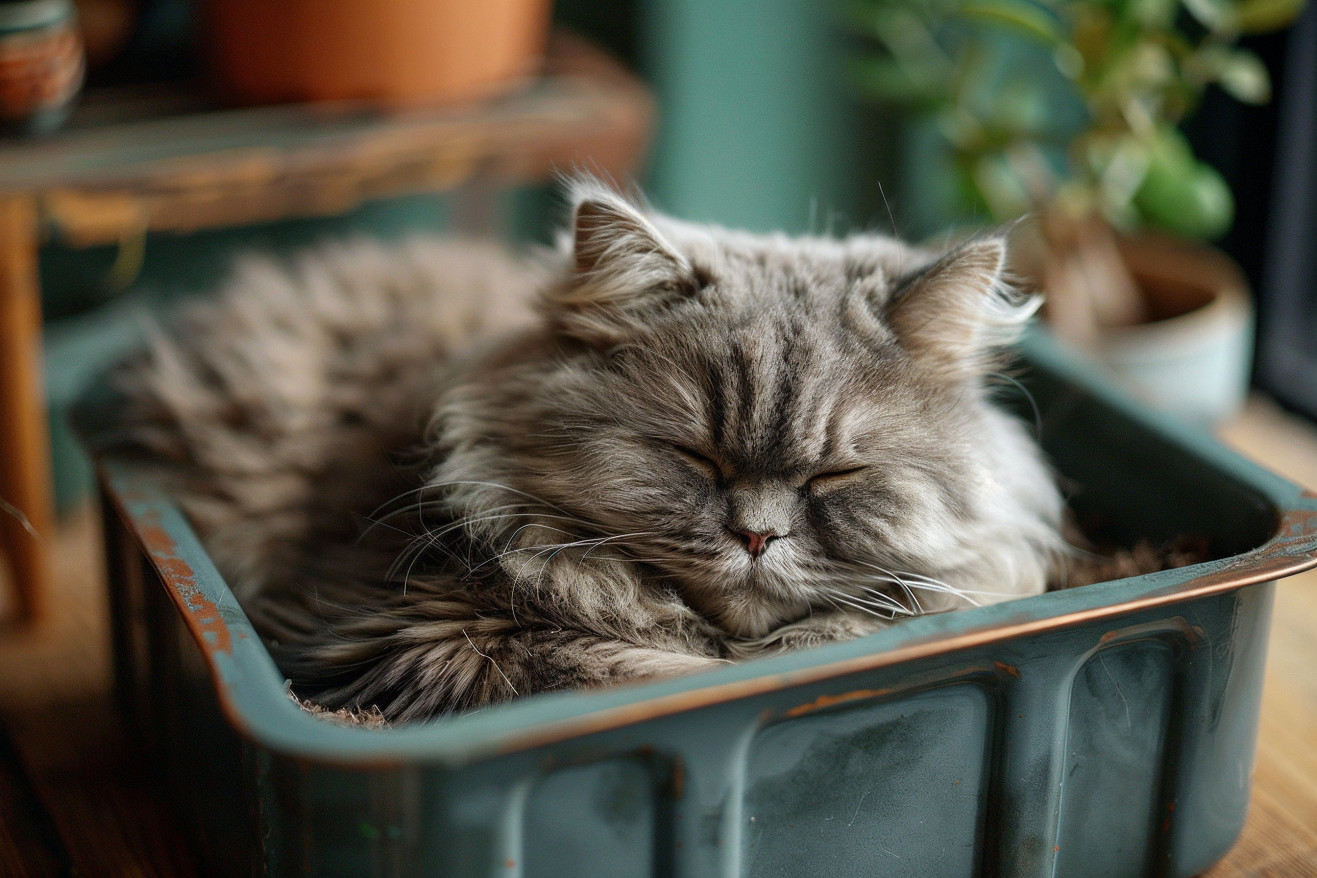Why Does My Cat Sleep in the Litter Box? Behavioral & Health Causes
16 March 2024 • Updated 14 March 2024

If you’ve ever walked in on your cat napping in their litter box, you’re not alone. Cats can sleep in their litter boxes for a variety of reasons, including stress, health problems, and even the litter itself.
However, this behavior can also be a sign that you need to look into urinary tract infections or constipation, or that you need to make sure that the litter box is being cleaned and maintained properly. Health issues should be addressed by a vet.
To help you get to the bottom of why your cat has chosen to sleep in such an unconventional location, we will cover a wide range of research in the fields of veterinary medicine, animal behavior, and environmental design.
With the help of experts, we will look at potential health issues, use behavioral science to understand the role of stress, and explore how the design of litter boxes can impact where cats choose to sleep.
By the end of this article, you will be able to better understand and meet the needs of your cat, who has chosen a rather odd place to take a nap.
Why does my cat sleep in the litter box?
Concerning Litter Box Behaviors: When to Be Worried About Your Cat’s Health
If your cat is sleeping in the litter box, it’s important to keep a close eye on them for other signs of medical issues. VCA Animal Hospitals explains that there are a number of medical problems that could cause this behavior.
For example, cats with urinary tract infections, bladder stones, or other painful issues may start to associate the litter box with their pain, leading them to spend more time there. These urinary problems can also lead to an increased urgency to urinate, which could explain why your cat is spending so much time in the litter box.
Changes in litter box behaviors can be a good way to catch potential health issues early. Nidirect says that changes in a cat’s behavior, including where they sleep, can be a sign of distress, boredom, illness, or injury. Since cats are creatures of habit, any changes in their routine, including sleeping in the litter box, should be taken seriously.
The ASPCA lists a number of diseases, including diabetes and cancer, that can cause a cat’s behavior to change. For example, symptoms like increased urination, which is common in cats with diabetes, may lead to your cat spending more time in the litter box.
It’s important to make sure that you’re keeping an eye on your cat’s health and talking to a vet to make sure that they’re getting a proper evaluation. Catching any potential issues early can help to ensure that your cat isn’t in pain and that their litter box behavior can be corrected.
What It Means When Your Cat Sleeps in the Litter Box
Stress and anxiety are the most common behavioral causes of cats sleeping in their litter boxes. Marta Amat and colleagues have shown that noxious stimuli or environmental pressures can surpass a cat’s ability to cope, leading to stress-induced behaviors. These behaviors can manifest as elimination issues or compulsive sleeping in the litter box.
Environmental changes are well-known stressors for cats. The Indoor Pet Initiative explains that even small changes in a cat’s environment, such as moving furniture or visitors, can disrupt a cat’s sense of security and lead them to seek out the comfort of a familiar space like the litter box.
In addition, a cat’s territorial nature is central to their relationship with their litter box. Cats may use their litter box as a place to mark their territory and feel safe or to respond to threats to their territory.
Penn Today explains that understanding feline behavior is key to understanding their behaviors, including their litter box habits. Cats’ evolutionary history of being solitary animals can impact how they respond to stress and where they choose to rest. Understanding these psychological and behavioral factors can help cat owners be more proactive in creating a less stressful environment that discourages cats from sleeping in the litter box.
How to Make Sure Your Cat Is Comfortable With Its Litter Box
The layout of a cat’s litter box can play a big role in how comfortable it feels in its environment. The Olympic Peninsula Humane Society recommends that the litter box be at least 1.5 times the length of the cat so that the cat has enough room to move around.
If the litter box is too small, the cat may not want to use it for its intended purpose and may instead use it as a place to sleep.
The San Diego Humane Society also points out that the type of litter box matters, and while covered boxes may be convenient for humans, some cats may find them too confining or scary. Some cats like privacy and may feel more comfortable using a covered litter box, while others may feel uncomfortable.
The cleanliness of the litter box and the litter itself also play a role in how comfortable a cat will feel using it. According to Preventive Vet, cats prefer to use fine, unscented clumping litters because they’re more comfortable. Litters with strong scents or rough textures can be uncomfortable, which may lead a cat to use its litter box as a bed instead.
When choosing a litter box, make sure to pick one that encourages a cat to use it for its intended purpose and keep it clean. By doing this, you can help your cat understand the difference between its bed and its bathroom, which will help it feel comfortable and keep its living space clean.
How to Keep the Litter Box Clean
Keeping the litter box clean is essential for your cat’s health and well-being. The Humane Society of the United States recommends scooping litter boxes at least once a day and doing a full litter change, including washing the box, on a regular basis.
The frequency of full litter changes will depend on the number of cats in your home and the type of litter you use, but as a general guideline, you may need to change non-clumping litter every other day and clumping litter every two to three weeks.
If you don’t keep up with litter box maintenance, it can lead to behavioral problems. Cat behaviorist Matt Wildman says cats will avoid a dirty litter box because of their strong sense of smell and natural inclination to keep their environment clean, which can lead to them eliminating outside the box or even using it as a bed.
Regular cleaning will help ensure that cats use the litter box for elimination and don’t start to think of it as a place to rest.
In multi-cat households, The Humane Society suggests having one litter box per cat, plus one extra, to avoid conflicts. This will also help ensure that one box doesn’t get too dirty too quickly.
By keeping the litter box clean and making sure it’s in a good location, you can help ensure that your cat uses it for elimination and doesn’t start to think of it as a bed, which will help support their health and well-being.
When to Seek Professional Help
If you’re paying close enough attention to your cat’s litter box habits, you may be able to tell when it’s time to seek professional help.
The Merck Veterinary Manual notes that behavior problems related to elimination, including choosing an unusual place to rest, may indicate that professional help is needed.
If your cat is constantly resting in the litter box, especially if there are other symptoms like straining to urinate or blood in the urine, you should take your cat to the vet. Any sudden change in behavior should be taken seriously as it could be the result of a medical or psychological issue.
When you take your cat to the vet, the vet will perform a thorough physical examination and may run tests to determine if there are any medical issues at play.
If you need help with your cat’s behavior, a certified cat behavior consultant or a veterinary behavior specialist can help. The American College of Veterinary Behaviorists and the American Veterinary Society of Animal Behavior both offer search tools to help you find professionals in your area.
Before your appointment, make sure you have a detailed history of your cat’s behavior, any changes in your cat’s environment, and your cat’s medical history. This will help your vet make an accurate diagnosis. Seeking professional help will help you ensure your cat’s health and happiness, so it’s important to make sure you get the help you need as soon as possible.
Solving the Riddle: Why Do Cats Sleep in Their Litter Boxes?
There are many potential causes for a cat to sleep in its litter box, from medical issues to stress. Cats may even come to see their litter box as a place to find relief from the pain of medical conditions like urinary tract infections or constipation. Behavioral issues like stress or changes in a cat’s environment can also lead to a cat seeking refuge in its litter box.
The impact of the design of the litter box on a cat’s behavior has been explored, with the right size and shape of the box being shown to prevent this unusual sleeping behavior. It’s also important to note that keeping the litter box clean and well-maintained is key to ensuring it is used properly and not as a bed.
As pet parents, it’s important to pay attention to our cats’ behavior and make changes when we notice something is wrong, including seeking help from a vet when necessary. By understanding the many potential causes of a cat sleeping in its litter box, we can help ensure our feline friends are happy and healthy. This means providing the best care possible and a safe, loving environment.


